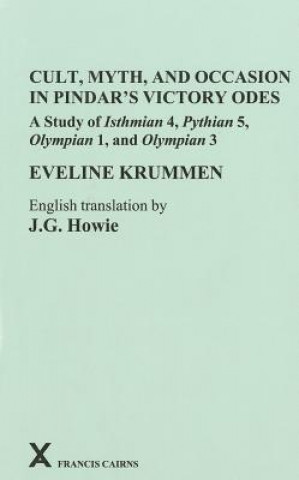
Kod: 04760298
Cult, Myth, and Occasion in Pindar's Victory Odes
Autor Eveline Krummen
In this pioneering study, first published in German as Pyrsos Hymnon. Festliche Gegenwart und mythisch-rituelle Tradition als Voraussetzung einer Pindarinterpretation (Isthmie 4, Pythie 5, Olympie 1 und 3) (1990), Eveline Krummen ... więcej
- Język:
 Angielski
Angielski - Oprawa: Twarda
- Liczba stron: 356
Wydawca: Francis Cairns Publications Ltd, 2014
- Więcej informacji o książce

420.29 zł
Zwykle: 451.99 zł
Oszczędzasz 31.70 zł
Dostępność:
50 % szansa Otrzymaliśmy informację, że książka może być ponownie dostępna. Na podstawie państwa zamówienia, postaramy się książkę sprowadzić w terminie do 6 tygodni. Gwarancja pełnego zwrotu pieniędzy, jeśli książka nie zostanie zabezpieczona.
Otrzymaliśmy informację, że książka może być ponownie dostępna. Na podstawie państwa zamówienia, postaramy się książkę sprowadzić w terminie do 6 tygodni. Gwarancja pełnego zwrotu pieniędzy, jeśli książka nie zostanie zabezpieczona.Przeszukamy cały świat
Podaruj tę książkę jeszcze dziś
- Zamów książkę i wybierz "Wyślij jako prezent".
- Natychmiast wyślemy Ci bon podarunkowy, który możesz przekazać adresatowi prezentu.
- Książka zostanie wysłana do adresata, a Ty o nic nie musisz się martwić.
Powiadomienie o dostępności
Wpisz swój adres e-mail, aby otrzymać od nas powiadomienie,
gdy książka będzie dostępna. Proste, prawda?
Więcej informacji o Cult, Myth, and Occasion in Pindar's Victory Odes
Za ten zakup dostaniesz 244 punkty
 Opis
Opis
In this pioneering study, first published in German as Pyrsos Hymnon. Festliche Gegenwart und mythisch-rituelle Tradition als Voraussetzung einer Pindarinterpretation (Isthmie 4, Pythie 5, Olympie 1 und 3) (1990), Eveline Krummen examines the related problems of the unity (or intelligibility and cohesion) and the 'occasionality' (the heuristic importance of the original performance situation) of Pindaric epinicia. She uses various approaches - including narratology, archaeology, and art history, as well as philology - to recover information about original performance occasions and original audience expectations, and thus to come to a clearer understanding of the structure and strategies of this sometimes baffing poetry. Throughout the book she focuses primarily on the interactions between myths and cult festivals, and on Pindar's skill in integrating and innovating upon traditional material. An introductory chapter discusses 'occasionality' and surveys scholarly views of the unity of Pindaric victory odes in general. The four main chapters deal in turn with each of the Odes selected as 'case-studies'. These all contain a passage referring to a cult festival. In Isthmian 4 and Pythian 5 the reference is explicit, and to a festival currently being celebrated: in Olympian 1 reference is made to a festival celebrated earlier at the place of victory, and in Olympian 3 the reference is again arguably to a festival still in progress. Krummen delineates the historical settings of the cults and their related festivals, and each chapter ends with a consideration of how the cult passage fits into the poem as a whole. Brief appendixes list Pindaric allusions to festivals and cults are listed, and give sketch maps of the topography of Thebes and of Cyrene. A bibliography and indexes are included. Study of the cult passages naturally includes study of their related myths. Adopting the approach of modern researchers in religious history, Krummen details the basic patterns, the 'programmes of actions' underlying Pindar's mythical and ritual narratives, patterns fixed in the cultures of the communities concerned. On this basis she shows, for example, that Pindar's treatment of the myth of Pelops in Olympian 1 goes beyond mere rationalisation; rather he alters its role within the audience's cultural expectations, in a way that makes his revision not only convincing but also profoundly acceptable. Modern approaches to Greek lyric narrative enable Krummen to clarify sequences of events in Pindar's foundation myth of Cyrene in Pythian 5, and archaeology guides her to the true role of his topographical allusions within his narrative. Comparison with rituals in other parts of Greece helps to explicate the text in both Olympian 3 and Isthmian 4, and Weinrich's theory of metaphor, in combination with archaeology, enables Krummen to identify the 'new-built crownings of altars' in Isthmian 4 and to reveal their full significance. Finally Krummen's view of the original occasions and the myths of these odes makes full use of surviving works of art. Throughout, the Greek text is kept firmly in sight: for instance, her meticulous discussion of text, grammar, and tense provides a sound basis for a convincing identification of the Antenorids in Pythian 5 and for the reconstruction of their role in the Carnea in Cyrene. Finally, Krummen reveals how in all four odes the cult passages contribute at literal, figurative, and associative levels to the praise of the patron. In that sense Krummen brings us closer to grasping the unity of these poems. Cult, Myth, and Occasion in Pindar's Victory Odes has already proved influential in its original German form. J.G. Howie's English translation will make it widely accessible to students and scholars throughout the English-speaking world. The author. Eveline Krummen has pursued the study of Classical Philology at the Universities of Bern, Zurich, Cambridge, and Tubingen, and she taught as an adjunct at the Universities of Bern and Zurich, occasionally standing in for Professor Most at the University of Heidelberg. At Zurich she was licensed in 1987 with a dissertation later published (1990) as Pyrsos Hymnon. Festliche Gegenwart und mythisch-rituelle Tradition als Voraussetzung einer Pindarinterpretation (Isthmie 4, Pythie 5, Olympie 1 und 3). She was habilitated at Zurich in 1997, with a two-part thesis: a monograph on the early Greek lyric in its cultural context; and a text and commentary of Jacoby;s FGrHist Teil IV fasc. 2 on ancient historical writings. In 1999 she was appointed to her present position as Professor of Classical Philology at the University of Graz, Austria. Her research interests are in early Greek literature, Greek historiography, and Greek religion, and she has contributed in these fields to a number of periodicals, collected papers, and encyclopaedias. The Translator. J. Gordon Howie studied at the Universities of Glasgow and Oxford (Balliol College), and taught in the Department of Greek (later Classics) at the University of Edinburgh, where he was Senior Lecturer in Classics and is currently an Honorary Research Fellow. He is a Member of the Institute of Translation and Interpreting. In addition to his own scholarly articles on early Greek literature, now collected in Exemplum and Myth, Criticism and Creation (2012), his translation of Detlev Fehling's Die Quellenangaben bei Herodot, on which he worked closely with the author to produce a definitive version, Herotodus and his 'Sources' (1989), is widely known and appreciated. He has also collaborated with Douglas Cairns on the translations in that scholar's Bacchylides. Five epinician Odes (2010).
 Szczegóły książki
Szczegóły książki
Kategoria Książki po angielsku Humanities History History: earliest times to present day
420.29 zł
- Pełny tytuł: Cult, Myth, and Occasion in Pindar's Victory Odes
- Autor: Eveline Krummen
- Język:
 Angielski
Angielski - Oprawa: Twarda
- Liczba stron: 356
- EAN: 9780905205564
- ISBN: 0905205561
- ID: 04760298
- Wydawca: Francis Cairns Publications Ltd
- Waga: 596 g
- Wymiary: 229 × 161 × 33 mm
- Data wydania: 26. May 2014
Ulubione w innej kategorii
-
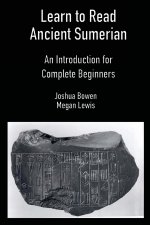
Learn to Read Ancient Sumerian
152.73 zł -

Russian Journal
61.39 zł -23 % -
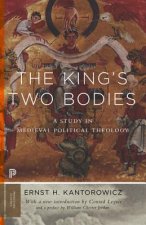
King's Two Bodies
126.03 zł -4 % -

Heart of Europe
89.11 zł -23 % -

Armies of Castile and Aragon 1370-1516
67.86 zł -15 % -

One Hell of a Gamble
133.92 zł -5 % -
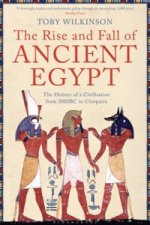
Rise and Fall of Ancient Egypt
79.80 zł -23 % -

Guns, Germs, and Steel
50.87 zł -4 % -

The Origins of Totalitarianism
40.35 zł -36 % -

Illustrated Encyclopedia of Uniforms of World War I
93.56 zł -23 % -

The Art of Combat
144.44 zł -
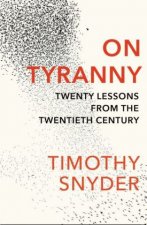
On Tyranny
35.29 zł -31 % -
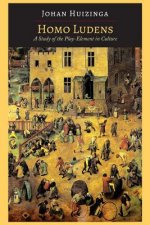
Homo Ludens
54.51 zł -

Tuesdays With Morrie
47.53 zł -23 % -
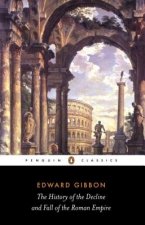
History of the Decline and Fall of the Roman Empire
61.39 zł -23 % -
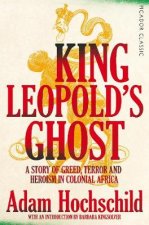
King Leopold's Ghost
52.19 zł -23 % -
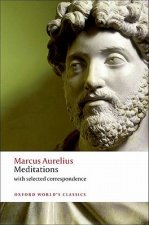
Meditations
45.71 zł -4 % -
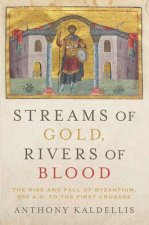
Streams of Gold, Rivers of Blood
152.73 zł -
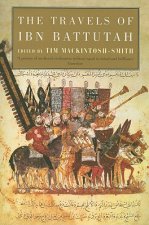
Travels of Ibn Battutah
52.19 zł -23 % -
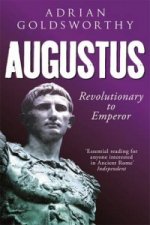
Augustus
70.70 zł -23 % -
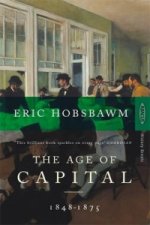
Age Of Capital
70.70 zł -23 % -
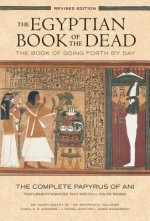
Egyptian Book of the Dead: The Book of Going Forth by Day : The Complete Papyrus of Ani Featuring Integrated Text and Full-Color Images (History ... M
146.16 zł -5 % -

Deng Xiaoping and the Transformation of China
126.13 zł -4 % -

Age Of Extremes
81.02 zł -15 % -

John Skylitzes: A Synopsis of Byzantine History, 811-1057
164.26 zł -4 % -
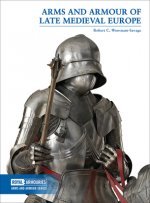
Arms and Armour of Late Medieval Europe
47.53 zł -23 % -

Alexander the Great
85.97 zł -5 % -
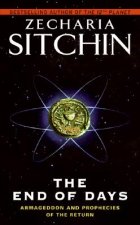
End of Days
41.67 zł -5 % -

Shake Hands With The Devil
61.39 zł -23 % -
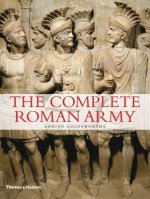
Complete Roman Army
93.56 zł -23 % -
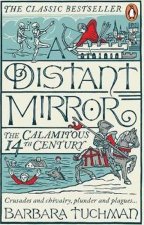
Distant Mirror
61.39 zł -23 % -
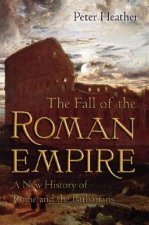
Fall of the Roman Empire
93.96 zł -5 % -

Fifties
93.96 zł -5 % -

After the Ice
79.80 zł -23 % -
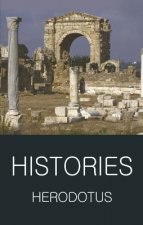
Histories
24.67 zł -23 % -

Savage Continent
70.70 zł -23 % -

Oxford IB Diploma Programme: The Cold War: Superpower Tensions and Rivalries Course Companion
225.46 zł -
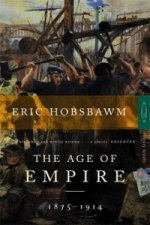
Age Of Empire
70.70 zł -23 % -

Pompeii
52.19 zł -23 % -

Life in a Cave
27.20 zł -15 % -

Oxford Illustrated History of Prehistoric Europe
169.63 zł -9 % -

On the Ocean
185.61 zł -

Flowers of Battle The Complete Martial Works of Fiore dei Liberi Vol 1
601.96 zł -
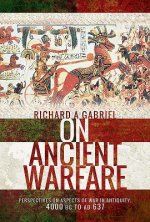
On Ancient Warfare
183.79 zł -6 % -

Access to History for the IB Diploma: Causes and effects of 20th-century wars Second Edition
134.12 zł -15 % -

Safe Area Gorazde
89.11 zł -23 % -

Yoga Body
85.97 zł -5 % -

Fear and Loathing on the Campaign Trail '72
61.39 zł -23 % -
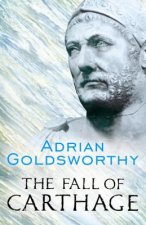
Fall of Carthage
70.70 zł -23 %
zadowolonych klientów
Od roku 2008 obsłużyliśmy wielu miłośników książek, ale dla nas każdy był tym wyjątkowym.
Copyright! ©2008-24 libristo.pl Wszelkie prawa zastrzeżonePrywatnieCookies


 21 milionów książek
21 milionów książek Dostawa 10.99 zł
Dostawa 10.99 zł (32) 444 93 66 (8-15.30h)
(32) 444 93 66 (8-15.30h)